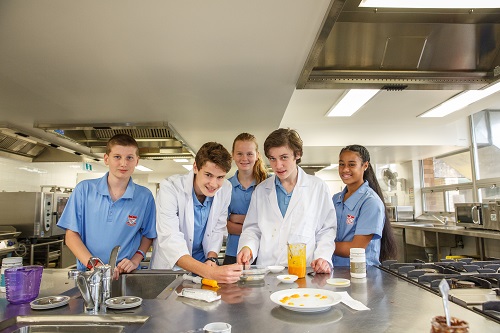
Molecular gastronomy is a personal passion of Rosalia Ram, who teaches Technological and Applied Studies (TAS) and hospitality at Wyong High School on the Central Coast of NSW.
It’s what you’d see TV chef Heston Blumenthal do and talk about – the chemical and physical transformations that happen to food when you cook it.
Recently, she set her students the task of creating a fried egg as a dessert, using mango for the egg yolk, coconut milk and different thickening agents for the egg white, walnut biscotti biscuit for toast and raspberry puree for the tomato sauce.
“I find the science behind food and cooking fascinating and I want my students to have that enthusiasm. I like the way you can change peoples’ perception of food just through cooking it. You can change the colours, flavours and nutrient content that way,” she said.
That’s why Ram was keen to put her hand up to be part of the P-TECH program.
“STEM has traditionally been seen as more maths and science, but I see TAS as a STEM subject. I kept sticking my nose in to get involved in P-TECH,” she said.
Industry liaisons helping schools
The Pathways in Technology (P-TECH) program is an Australian version of an idea that originated in New York. Not-for-profit Skilling Australia Foundation (SAF) partnered with interested stakeholders to develop a local program that began in Victoria in 2016.
Thanks to Federal Government funding, there are now 10 P-TECH pilot sites across the country – involving over 2,500 students – with four more partnerships in development.
P-TECH is all about providing industry-supported pathways in order to increase the number of young people achieving a post-school STEM-related qualification.
The Federal Government funding has enabled a Skilling Australia Foundation (SAF) industry liaison officer to be placed at each school to set up partnerships with training and education providers, business, industry and community.
The aim is to develop and implement a P-TECH program aligned to regional skill demands, and to ensure students from Year 9 onwards are immersed in diverse local STEM-based activities.
Mars Food Australia - the makers of Masterfoods®, Dolmio®, Uncle Ben’s®, Kantong® and Promite®, IBM Australia and Sanitarium Health & Wellbeing are the industry partners.
‘The freedom to be flexible’
University of Newcastle is the tertiary education partner. Central Coast Council, Central Coast Industry Connect Group and Regional Development Australia Central Coast are interested in the opportunities that the Partners are creating and that they can further support in the program.
Ram is one of three TAS teachers at Wyong and said her role as Food Technology teacher is to “formulate ideas”. It took a bit of work, but she’s successfully delved into the syllabus for units of works and topics she could align to P-TECH.
“We had the freedom to be flexible and not too rigid through the elective working with the industry partners and the university, too. So, we’ve put together the course for Year 9 and 10 students in a bit more of a science and food way.”
‘Promising changes’ being seen
Ram has industry experience too, having worked in and opened restaurants as a server and in the kitchen. She said she’s grateful that SAF is linking the school with industry and education partners.
“As a teacher, you don’t have time for that kind of liaison,” she said.
Ram said even though it’s early days for P-TECH at the school, she’s “starting to see changes in engagement and achievement”.
“Some of the disengaged kids are finding the activities fun and get more involved. It’s good to see them in the group work coming up with ideas.
“P-TECH has got me more enthusiastic about teaching. I’ve enjoyed thinking outside the box. We can be more imaginative in the way we deliver and it’s a lot more collaborative,” she said.


